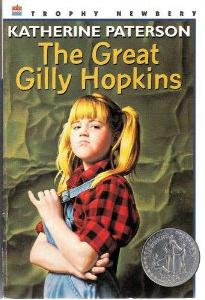HarperTrophy. - 1978
Reading Level: 8+ Number of Pages: 148 Genre: Realistic Fiction
ALA Notable Children's Book
Winner of the Christopher Medal
A Jane Addams Award Honor Book
The Horn Book Fanfare Honor List
"Best of the Best" Children's books 1966-1978 (SLJ)
Summary: Galadriel Hopkins is a foster kid with a bad attitude. She has been pushed from home to home for so long, and has grown to know how to manipulate people around her. We find her in the story heading to yet another foster home, this time with a woman named Trotter, who has another foster son named William Earnest, a kid with some kind of mental handicap. Gilly immediately begins to push people around, swearing and causing a fuss, and is shocked at some of the happenings at the Trotter home. For example, Trotter invites their neighbor Mr. Randolph to dinner, a blind African American. Gilly is shocked to have to sit and eat with a black man, and is even more shocked to discover that her teacher at school is black. Her efforts to misbehave and run away are not handled the same way as they had always been before; this time her bad behavior is met with love and compassion, but the damage has already been done. As soon as she arrived at her new foster home, Gilly wrote a letter to her biological mother, saying that she needed to leave this house as soon as possible. One day her biological grandmother arrives, and promises to help Gilly leave this place with the "enormously fat" foster mother and her "retarded" son. Except, by this time, Gilly doesn't want to leave. She has somehow begun to love the odd family, including William Earnest, and has started to teach him to stick up for himself.
Her grandmother arrives, and Gilly is taken to live with her, and eventually the time comes to meet her biological mother. Gilly's expectations are crushed when she discovers that her mother has not come to take her daughter home, and does not love her. Gilly escapes for a moment and calls Trotter on the phone, pleading for some way for her to come back to the only place that has ever offered her permanence and love. Unfortunately, this is not possible, but Gilly has learned that in order to receive love, one must also give love.
"'First thing, when somebody yells at you, don't throw your hands up' --she imitated him-- 'and act like you think they're going to kill you'
'Pow?' He swung his little fist in a kind of question mark.
'Naw, not first thing. See, they may not be even meaning to hit you. First thing is, you take a deep breath--' She filled her diaphragm and waited to imitate her, his ribs poking through his shirt. 'Then you yell like this: Get the hell outa my way!'"
My Impressions: This book approaches some very real topics, and Gilly is very easy to identify with. Essentially she is a foster-child with an anger issue, but her character is deeply harrowed by sorrow and a deep desire to belong somewhere. What she wants is her biological mom, and she vents her frustration by misbehaving. To me this story is a beautiful exploration of frustration and anger, and how a person can take even a hopeless situation and let it change them.
Parent's Guide: As mentioned above, the story involves itself in some very real topics, such as foster parenting, the reality that a child can experience being unloved. Gilly also has some bad character traits, and exhibits racism, deism, and a bit of cursing. Gilly also steals money from Trotter and her blind neighbor.
Recommendations:This would be a great book for kids to discover if they may possibly identify with Gilly. I enjoyed this book because the main character is easy to love and feel for.

No comments:
Post a Comment